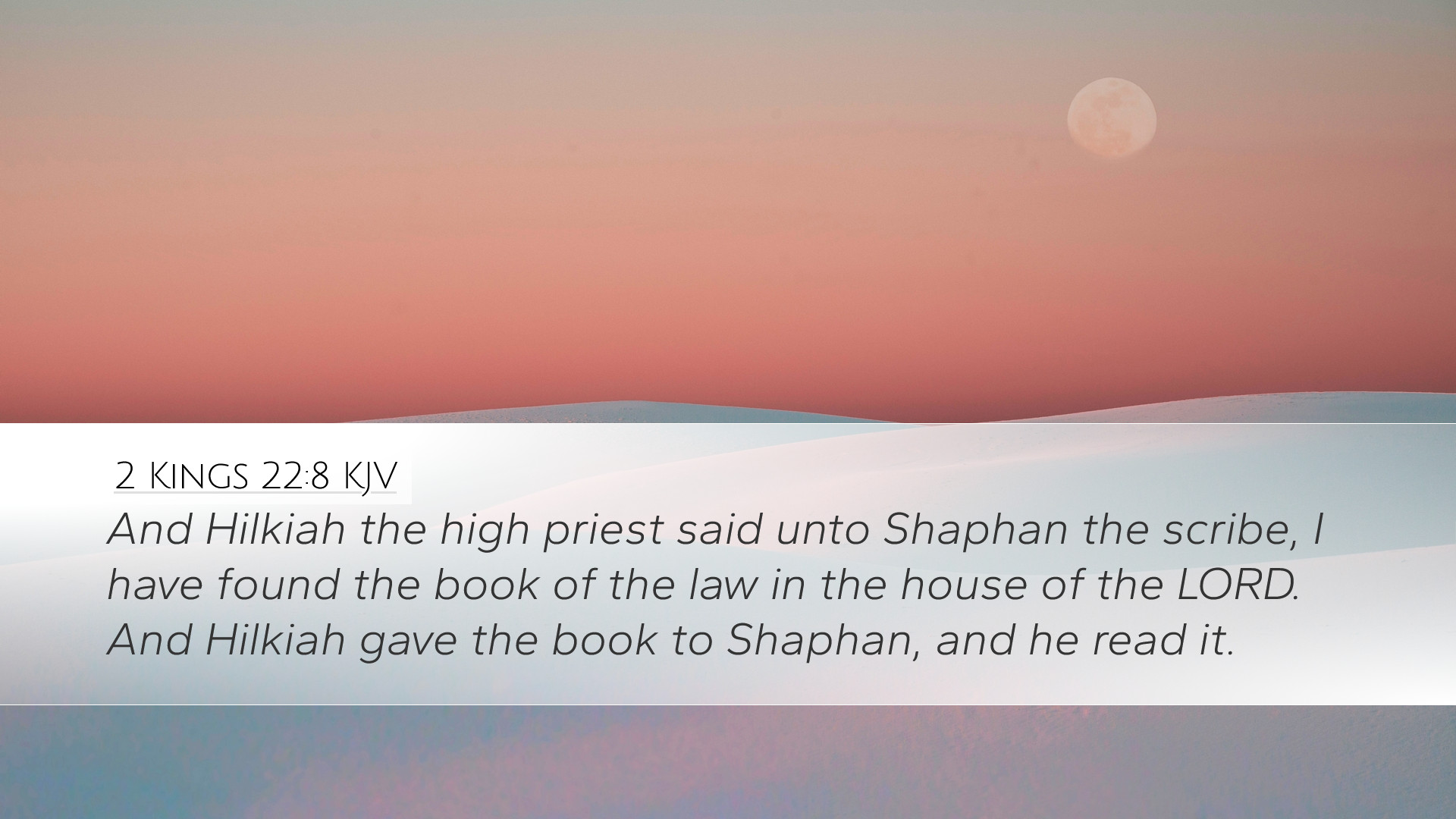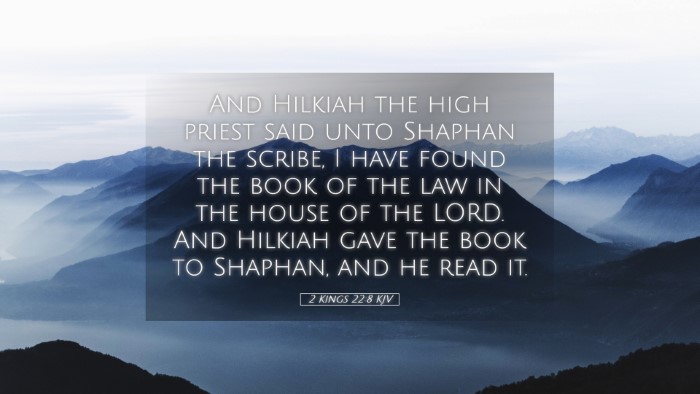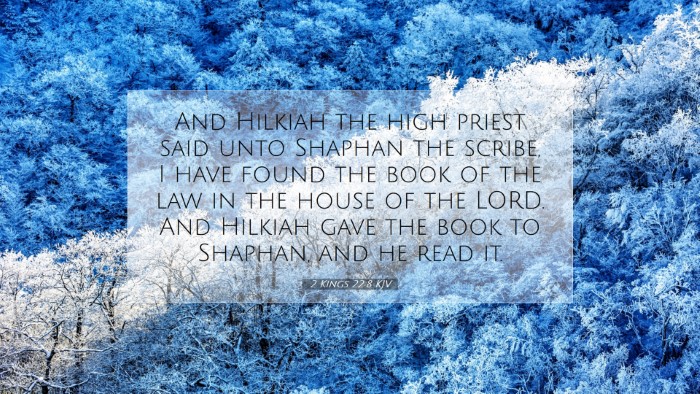Old Testament
Genesis Exodus Leviticus Numbers Deuteronomy Joshua Judges Ruth 1 Samuel 2 Samuel 1 Kings 2 Kings 1 Chronicles 2 Chronicles Ezra Nehemiah Esther Job Psalms Proverbs Ecclesiastes Song of Solomon Isaiah Jeremiah Lamentations Ezekiel Daniel Hosea Joel Amos Obadiah Jonah Micah Nahum Habakkuk Zephaniah Haggai Zechariah Malachi2 Kings 22:8
2 Kings 22:8 KJV
And Hilkiah the high priest said unto Shaphan the scribe, I have found the book of the law in the house of the LORD. And Hilkiah gave the book to Shaphan, and he read it.
2 Kings 22:8 Bible Commentary
Commentary on 2 Kings 22:8
This verse marks a significant moment in the history of Judah, as it highlights the discovery of the Book of the Law in the temple during renovations under King Josiah. This event has profound implications for the religious and political life of Israel, and is examined through various theological lenses in public domain commentaries.
Overview of 2 Kings 22:8
In 2 Kings 22:8, we find the high priest Hilkiah declaring to King Josiah that he has found "the Book of the Law" in the temple. This discovery is pivotal, signaling a renewal of covenantal faithfulness after a period of spiritual decline.
Commentary Insights
1. The Significance of the Discovery
Matthew Henry observes that this discovery symbolizes God's providential care for His people. The Book of the Law had been lost amid the idolatry and neglect of the temple, yet it was in God's plan to restore it at this critical juncture. Henry emphasizes that the recovery of Scripture is essential for spiritual revival, as it brings the people back to their covenant relationship with God like a lamp in the darkness.
Albert Barnes adds to the significance by suggesting that this moment illustrates the importance of Scripture in guiding the nation’s morality and governance. The Law serves not merely as a set of rules but as a covenant framework that embodies Israel's identity and purpose. Barnes notes that this finding catalyzed a sweeping reform that ultimately led to moral and spiritual revitalization in the land.
2. The Role of Hilkiah
Adam Clarke sheds light on the character of Hilkiah, who is portrayed as a devout priest committed to the restoration of true worship. Clarke points out that Hilkiah’s actions demonstrate leadership in seeking God, even amidst widespread spiritual apathy. His role in the discovery shows that sincere dedication to the temple and its maintenance is foundational for the health of the community.
3. The Implications for Josiah's Reign
Henry notes that King Josiah’s immediate response to the discovery of the Book of the Law is crucial. The king represents a generation that desires to return to the worship of Yahweh. By acknowledging the importance of the Law, he sets into motion reforms that will deeply impact the nation. Barnes claims that Josiah’s reforms are both political and spiritual, showing that true leadership integrates faith and civic responsibility.
4. Spiritual Revival and Reform
In the light of this discovery, revival is not simply a matter of returning to rituals, but a heartfelt turning to God. Clarke emphasizes that reading and understanding the Law is crucial for a genuine revival. The Law awakens the conscience and demands not only adherence but transformation of heart.
5. Lessons for Contemporary Believers
The discovery of the Book of the Law brings forth various lessons for modern readers. Firstly, there is the importance of engaging with Scripture in a meaningful way. As seen in this pivotal narrative, a renewed engagement with God's Word can lead to significant transformation, personal and corporate. Henry stresses that neglecting the Word often leads to moral and spiritual decline.
Secondly, like King Josiah, contemporary believers are urged to seek out truth amidst a culture that often distorts or disregards it. Barnes admonishes leaders to be diligent in fostering environments where God’s Word is honored and where true worship is encouraged.
6. Conclusion
In conclusion, 2 Kings 22:8 serves as a potent reminder of the necessity of God’s Word in the life of individuals and communities. The profound implications of the recovery of the Law highlight the interconnectedness of faith, leadership, and societal well-being. As we reflect on this passage, may we be inspired to value Scripture and allow it to guide our lives and communities faithfully.
References
- Matthew Henry, Commentary on the Whole Bible
- Albert Barnes, Barnes' Notes on the Bible
- Adam Clarke, Clarke's Commentary on the Bible


